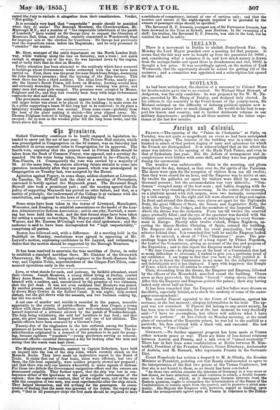'Jt Vrnuitirto.
Oxford University continues to be busily engaged in legislation in- tended to carry out the act of last year. The Private Hall statute, which was promulgated in Congregation on the 3d instant, was on Saturday last submitted in seven separate votes to Congregation for its approval. The fourth vote, requiring that the prayers used in Private Halls should be taken from the Book of Common Prayer, was opposed, and a scrutiny de- manded. On the votes being taken, there appeared to be—Planets, 42; Non-Placets, 14. Consequently the vote was carried by a majority of 28. At the same time, the statute allowing future statutes to come into operation immediately after they are passed, which was promulgated in Oongregation on Tuesday last, was accepted by the House.
Agitation against Popery, in some shape, seldom slumbers at Liverpool. On Tuesday, Dr. bigieill took the chair at a meeting of Protestants, convened to testify against the Maynooth grant. The Reverend Hugh Stowell also took a prominent part ; and the meeting agreed that the policy of supporting Maynooth has proved an utter failure, and that, as a matter of principle, the endowment of the College is at variance with the constitution, and opposed to the laws of Almighty God.
Some steps have been taken in the towns of Liverpool, Manchester, Worcester, and Reading, to establish associations on the model of the Lon- don Administrative Reform Association; and in one city, Norwich, a meet- ing has been held this week, and the first formal steps have been taken for setting a society on foot there. The Mayor presided ; Mr. Lindsay, Mr. Warner, and Mr. Torrens M'Cullagh were the chief spokesmen; and the audience is said to have been distinguished for "high respectability," comprising all parties.
Boston has followed suit, with a differenee. At a meeting held in the Guildhall on Monday, resolutions were agreed to approving of Mr. Layard's motion, expressing confidence in Mr. Layard, and intimating a desire that the motion should be supported by the Borough Members.
It has been resolved to ascertain the true meridian of Dover, in order to establish a standard meridian there. Mr. Glaisher of the Greenwich Observatory, Mr. Walker, telegraph-engineer to the South-Eastern Rail- way, and Captain Noble, superintendent of the Cinque Port Pilots, com- menced operations early in the week.
Love, or what stands for such, and jealousy, its faithful attendant, exact their victims. Joseph Meadows, a young fellow living at Dudley, courted Mary Anne Mason. Seized with a passion of jealousy, he secretly armed himself with a carbine, and, unrestrained by the presence of two witnesses, shot the girl dead. It was not even surmised that Meadows was armed. By another process, and fortunately without success, Edward Aspinall tried to drown Mary Cowley in the Salford Canal. It was night; help seemed distant, but the girl strove with the assassin, and two boatmen coming up, her life was saved.
A sad case of murder and suicide is recorded in the papers, traceable apparently to the cruelty of parish-officers. Mary Ann Cooper, a young widow with three children industrious and well-conducted, suddenly found herself deprived of a pittance allowed by the parish of Woodnesborough. The help being withdrawn, she sold her furniture to buy food; and that gone, she grew insane, and hanged herself and one of her children. The parish-officers have been censured by a Coroner's Jury.
Twenty-five of the ringleaders in the late outbreak among the Russian prisoners at Lewes have been sent to a prison-ship at Sheerness. The in- subordination originated in a demand of the prisoners to be paid for pump- ing, because eighteen " younkers "—young gentlemen serving as noncom- missioned officers—received threepence a day for looking after the men and seeing that the wards were kept clean.
The Magistrates of Falmouth, assisted by Captain Robertson, have held an inquiry into the loss of the ship John which recently struck on the Manacle Rocks. They have made an instructive report to the Board of Trade. It states that out of four boats, three were efficient, but two of them, the life-boat especially, were neither properly stowed nor prepared ; and that there was only one lantern wherewith to make signals of distress. For these two defects the Government emigration-officer and the owners are pronounced culpable. They further report, that the ship was lost in con- sequence either of the ignorance or the gross culpable carelessness of the captain ; that the captain's conduct, that of the chief mate, and of the crew with the exception of two men, was most reprehensible after the ship struck. They helped themselves, and did nothing for the passengers. In conse- quence of finding that the mate was ignorant of his duties, the report sug- gests, "that in all passenger. ships the first mate should be required to have a certificate of competency, instead of one of services only ; and that the number and nature of the night-signals required to be provided by the owners of passenger-ships should be specified.'
The Reverend H. P. Dwarris, youngest son of Sir Fortunatus Dwarris, has been drowned in the Tyne at By well, near Ilexharn' by the swamping of a skiff: his brother, the Reverend E. P. Dwarris, was also in the boat, but he reached the land in safety.


























 Previous page
Previous page